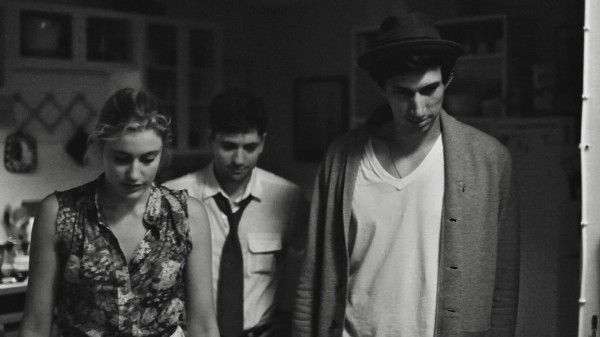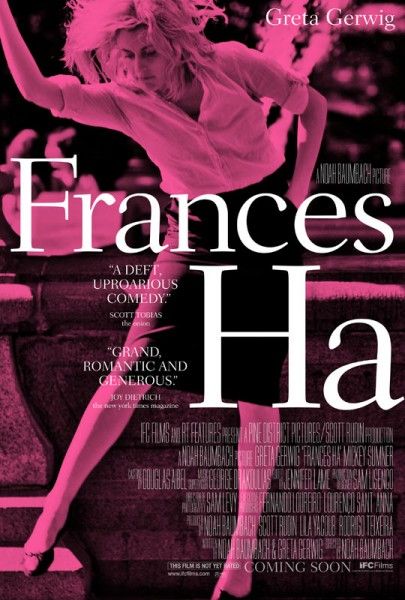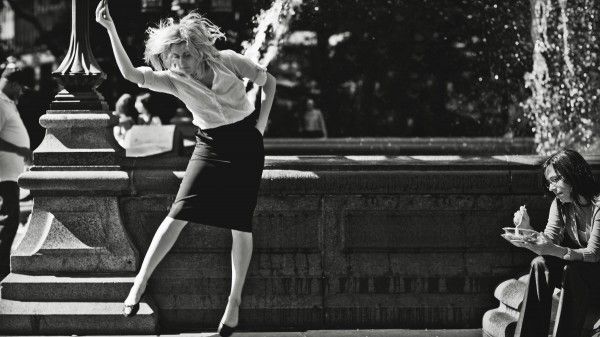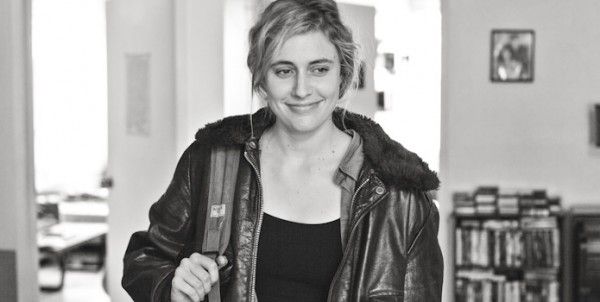Filmmaker and Academy Award nominee Noah Baumbach’s charming and quirky dramatic comedy, Frances Ha, is a modern comic fable that examines the human condition and explores New York, friendship, ambition, failure and redemption. Greta Gerwig, who co-wrote the screenplay with Baumbach and starred earlier in Baumbach’s Greenberg, plays the title role. Opening May 17th, the film was shot on location in New York City and features a terrific cast of up-and-coming actors that include Mickey Sumner, Adam Driver, Michael Zegen and Patrick Heusinger.
In an exclusive interview, Baumbach talked about how the finished film compared to his original vision, what fuels his creative collaboration with Gerwig, writing a story populated by intelligent, funny and relatable characters, what his casting choices brought to the film, why he is drawn to Gotham, the challenges of filming in NYC, why he decided to shoot in black and white, and how he used music to elevate and expand the movie. He also discussed his upcoming projects including reteaming with Gerwig on a new film set in New York City, an animated feature in development at DreamWorks, directing the Ben Stiller drama While We’re Young, and adapting The Emperor’s Children for Ron Howard and Brian Grazer. Hit the jump for the interview.
Question: My boss at Collider, Steve, who runs the site, made me ask this first: I loved Fantastic Mr. Fox. What do I need to do to get you to make another animated film with Wes Anderson?
Noah Baumbach: (Laughs) I don’t know. Get us in the same room together more often.
How did the finished film compare to what you had envisioned?
Baumbach: Frances Ha is the closest final product to what I had in my head of any movie I’ve made. I’m not entirely even sure why that is. When I make a movie, I have both a specific and vague, amorphous dream idea of what the movie is going to be. Of course, I don’t actually know what it’s going to be, but I’m still striving to get to some place with it. Somehow, when Frances Ha was done, I felt like, “Yeah, this is what I thought I was doing.”
This is your second collaboration with Greta Gerwig. Can you talk about what fuels your creative relationship and why it’s been so successful?
Baumbach: In our very different ways, we have very similar senses of humor and sensibilities. I mean, when we started on Greenberg, she was just an actor in something I had written, but her interpretation of it felt to me almost authorial. It was almost like she took it on in a way that felt like she took it away from me and made it her own. When I approached her about maybe doing something together, initially I wasn’t even sure we’d write it together. I just asked her if she had ideas about things, and she wrote me a list of things that she was thinking about that could be in a movie. I was so inspired by it and I felt like I could already understand and see what the movie was. But, there was also something about it that felt almost like I could have written what she wrote in some way. I felt very little difference between our voices when we then subsequently wrote the script together. She would write a whole scene, and I would write a whole scene, and they would fit together almost [seamlessly]. We would go over it and rewrite, but they were very much always of the same voice.
This film is optimistic and fast-paced; the characters are intelligent, funny and relatable; the story is told with a lot of compassion; and even the most mundane actions of the characters have charm and substance. How hard was it to get the script to the place to make all this happen?
Baumbach: I’m trying to remember how long it took. The script, probably all in, took a year to write, but it wasn’t like a year sitting in a room every day. We had breaks, and I thought I was going to make another movie first, and then I didn’t. She was shooting, as an actor, doing other movies. But there was always something about the script, that even when it was partially written sitting on our computers, I always felt like it was alive and that all it needed was attention. It was ready to keep growing. I don’t always feel that way about something I’ve started and maybe put aside. I lose interest in it, or it just doesn’t crackle anymore, but I kept returning to this one in my head. I think that was true for Greta, too. When we finally decided to do it, we had discussed the last part of the script and we knew where it was going, but we wrote the last part in a much quicker, shorter period of time than the first part which we’d had sitting there. That is to say that it was something that was very much inside us, so that when it was done and when we made it, it was already living. It didn’t ever feel that difficult to fill it out, to give it all that life. It was always inside there somewhere.
How long was the first cut of the movie? Did you have a lot of deleted scenes and will they end up on the eventual Blu-ray?
Baumbach: No. The first cut of the movie is pretty much the same length as [the final cut]. But that’s how I work. When I’m editing, I tend to cut, go back over it, cut, go back over it, cut, so by the time I’m done, even with a cut, I don’t have a rough cut and then work on it so much. I have a pretty rigorous cut of the movie that’s usually in the range of what the final movie is going to be. It doesn’t mean I don’t work on it a lot after that, but I get it into a shape so I feel I can really tell what it needs, or at least it’s ready to show people. With this, it was in pretty good shape by the time I’d finished it. There were some things that we went back and shot. We shot some extra little pieces afterward, and I reshot one scene because I didn’t like the sound. The sound was wonky. But there’s no 2-1/2 hour version of it sitting somewhere, and there really isn’t anything cut. There are some little pieces cut, but nothing that would be fun on a Blu-ray.
The cinematography is beautiful. Why did you choose to shoot the film in black and white?
Baumbach: I’d wanted to make a movie in black and white, and there was something about this material and this character. It was the inherent romance of the character and her romantic view of the world. It felt like she should have a cinematic document of her life. I mean, it’s a kind of an ordinary life, but I wanted it to feel beautiful and joyful. The music is that way too. The music is big and cinematic. I felt like that’s what black and white does. That was my first idea, but since looking back at it, I also think it was a way for me to shoot in New York again. It helped me see the city in a new way. I’ve grown up there. I shot a movie in Los Angeles before, and I was coming back to New York, and it was a way to re-see the city.
Four of your six features have been directed in New York City. What draws you to Gotham?
Baumbach: It’s my home. I like having associations with locations beyond their meaning for the specific movie. I find that I will go back and shoot on the block that I grew up on. When I shot The Squid and the Whale, that was more at least a fictional version of growing up in Park Slope (Brooklyn) and my life, but even if it’s not something like that, I like to have memories of a place. It brings something extra. I’m not even sure what it is. I mean, it’s the same part of it as I like using friends in small parts or people I know or my doorman. There’s a familiarity that makes me feel grounded, and then it allows for me to invent more.
You draw on a lot of up-and-coming talent like Mickey Sumner, Adam Driver, Michael Zegen and Patrick Heusinger. Can you talk a little about your casting choices and what they bring to the film?
Baumbach: With this movie, I wanted to cast it out of the city. I auditioned everybody. Everyone who is in it, except for some people who are friends of mine I put in, like in a dinner party there’s some people I know who I’ve worked with before, but almost everybody was auditioned. I felt like everybody matched the part they played, which is obviously what you always want to do. We were able to be pretty rigorous about it. Also, we didn’t show anybody the script beyond what they were in. It was a way almost for actors to come in and just play the moment and just be there for that day or those days, and pass through. Nobody had to know about their function in the movie or make sure that they were doing that right. I could worry about that, but they could just live in that apartment for those days. I think that brings something to the movie.
What are the challenges of shooting in NYC? Were there any unusual surprises on this production?
Baumbach: I like to try to shoot in the city in a way that allows the city to go about its business while we’re shooting, and that’s always a challenge because unfortunately people on the street don’t know not to look in the camera or interact with the actors. That’s always a challenge, but I feel like when you get it, there’s a kind of energy that’s unquantifiable. It’s the kind of energy I always felt like you got from a lot of the 70’s New York movies like Midnight Cowboy where you really feel these people are in the world of New York. To me, there’s a real difference between that and movies where you can tell they blocked off the street and these are all extras. That’s always a challenge because sometimes the best take for the actor involves some guy just standing and staring at the camera or giving you the finger. You can’t use that one. Or you can. (laughs)
The music really captures the mood of the moment so well and sets the perfect tone for the film. Can you talk about what inspired some of the choices you made?
Baumbach: When I was cutting the movie, I felt like it should have some kind of grand, big score. I went back to these old French scores, a lot of them from Truffaut movies and French New Wave. I was also curious how far I could push it. How big can it go? I felt it never went too far. It always seemed to elevate or expand the movie, which was new for me, because my movies up until now have had scores. They’ve rarely been underscored, but I’ve rarely scored a scene in any kind of an emotional way. They’re working more in some other way with the movie. This was almost more old-fashioned in that way. If Frances and Sophie are having their picnic in Bryant Park, it’s glorious and romantic and big. I put all these scores in, almost like a collage of these things. For a while, I was thinking, “Can I figure out a way? Is there anything I could get someone to compose that would feel like this?” They’re really like one of a kind. Ultimately, I got the rights and kept them in there.
What did you learn about yourself or take away from the experience of making this film?
Baumbach: I feel like it was one of those rare times. Not always the experience of making a movie goes into the experience of watching a movie. I’ve had great experiences or joyful experiences making a movie that people found very disturbing. (laughs) I feel like there was a lot of joy that went into making this movie and I really do think it somehow translated to the final product. I have no idea how that happened, but if I could bottle that, I would try to.
What’s next?
Baumbach: I’m going to make a movie called While We’re Young that I wrote with Ben Stiller in the fall in New York.
Any future plans to reteam with Greta Gerwig? I understand you’re planning a follow-up to Francis Ha?
Baumbach: Greta and I are making another movie after Francis Ha but there’s no relation to it. It’s just another movie that the two of us are doing in New York.
What about your animated feature about a dog that’s in development at DreamWorks?
Baumbach: I do have an animated movie at DreamWorks that I’m working on now. The animation process is a long road, so we’re in the early days of that. I really love it. I’m excited about that.
What about Emperor’s Children? Are you writing that and will Brian Grazer and Ron Howard produce? Is this a project that’s happening?
Baumbach: Emperor’s Children is something that I adapted initially for Ron to direct, and then for a while I was going to maybe direct it. It’s not anything that’s happening right now, although I really like the process.
Were you ever offered something that you said no to that you wish you’d said yes?
Baumbach: Nothing that I’ve turned down do I feel like I should have done. Because I’ve generated everything I’ve done, I’ve never really considered doing something that I haven’t originated myself. I mean, there are definitely things that I’ve been brought that someone else made good movies out of. But it’s not a path I’ve followed, so I don’t have regret.
I hope one of these days we’ll see a follow-up to Fantastic Mr. Fox.
Baumbach: (laughs) We’ll see.




